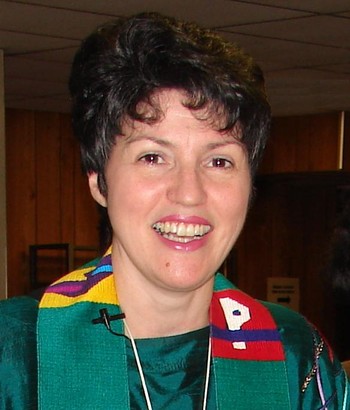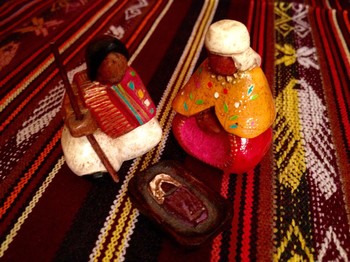A space for a contemporary woman disciple to give voice to justice concerns in a world where some still think that women’s words are just leros (Greek for “nonsense”) or, in Spanish, disparates
 Let them in
Let them in
A reflection based on Mark 9:30–37 as a resource for Sunday’s liturgy
by Magdalena I. García
They went on from there and passed through Galilee. He did not want anyone to know it; for he was teaching his disciples, saying to them, “The Son of Man is to be betrayed into human hands, and they will kill him, and three days after being killed, he will rise again.” But they did not understand what he was saying and were afraid to ask him. Then they came to Capernaum; and when he was in the house he asked them, “What were you arguing about on the way?” But they were silent, for on the way they had argued with one another who was the greatest. 35 He sat down, called the twelve, and said to them, “Whoever wants to be first must be last of all and servant of all.” Then he took a little child and put it among them; and taking it in his arms, he said to them, “Whoever welcomes one such child in my name welcomes me, and whoever welcomes me welcomes not me but the one who sent me.” —Mark 9:30–37
The quiet ones, the still ones,
the ones with clean hands and dry feet.
Let them in!
The noisy ones, the moving ones,
the ones with dirty hands and muddy feet.
Let them in!
The older ones, the stronger ones,
the ones with healthy bodies and firm voices.
Let them in!
The younger ones, the weaker ones,
the ones with sickly bodies and feeble voices,
Let them in!
The white ones, the blonde ones,
the ones with light skin and straight hair.
Let them in!
The black ones, the brunette ones,
the ones with dark skin and wiry hair.
Let them in!
The affluent ones, the upper class,
the ones with secure housing and savings in the bank.
Let them in!
The poor ones, the lower class,
the ones with transient housing and Link card¹ in hand.
Let them in!
The married ones, the engaged,
the ones in conventional courtships and traditional families.
Let them in!
The single ones, the divorced,
the ones in committed relationships and alternative families.
Let them in!
The native ones, the naturalized,
the ones with valid passports and a promising future.
Let them in!
The alien ones, the undocumented,
the ones with expired visas and an uncertain future.
Let them in!
Open the doors, welcome all people,
invite them into the community
without distinctions,
knowing that God has embraced them.
Open your arms, welcome all people,
invite them into your circle
without conditions,
remembering that God comes with them.
Let them in! Let God in!
Magdalena I. García is a PC(USA) teaching elder and a hospice chaplain for Vitas Healthcare in Chicago. She is a graduate of McCormick Theological Seminary and a recipient of the 2008 PC(USA) Women of Faith Award. For permission to use content, write to magdalenagarcia@comcast.net.
Notes
[i] A debit card issued by the Illinois Department of Human Services to low-income people.

A nativity from Ecuador reminds us that God often comes in the stranger, the one we refuse to let in.
Déjenlos entrar
Una reflexión basada en Marcos 9:30–37, un recurso para la liturgia dominical
por Magdalena I. García
Cuando se fueron de allí, pasaron por Galilea. Pero Jesús no quería que nadie lo supiera, porque estaba enseñando a sus discípulos. Les decía: “El Hijo del Hombre será entregado a los poderes de este mundo, y lo matarán. Pero, después de muerto, al tercer día resucitará”. Ellos no entendieron lo que Jesús quiso decir con esto, pero tuvieron miedo de preguntárselo. Llegaron a Cafarnaún, y cuando ya estaban en la casa, Jesús les preguntó: “¿Qué tanto discutían ustedes en el camino?” Ellos se quedaron callados, porque en el camino habían estado discutiendo quién de ellos era el más importante. Jesús se sentó, llamó a los doce, y les dijo: “Si alguno quiere ser el primero, deberá ser el último de todos, y el servidor de todos”. Luego puso a un niño en medio de ellos, y tomándolo en sus brazos les dijo: “El que recibe en mi nombre a un niño como éste, me recibe a mí, y el que me recibe a mí, no me recibe a mí sino al que me envió”. —Marcos 9:30–37
Los callados, los tranquilos,
los que tienen las manos limpias y los pies secos.
¡Déjenlos entrar!
Las ruidosas, las inquietas,
las que tienen las manos sucias y los pies enlodados.
¡Déjenlas entrar!
Los mayores, los más fuertes,
los de cuerpos saludables y voces firmes.
¡Déjenlos entrar!
Las menores, las más débiles,
las de cuerpos enfermizos y voces débiles.
¡Déjenlas entrar!
Los blancos, los rubios,
los que tienen la piel clara y el pelo lacio.
¡Déjenlos entrar!
Las negras, las morenas,
las que tienen la piel oscura y el pelo crespo.
¡Déjenlas entrar!
Los ricos, los de clase alta,
los que tienen vivienda estable y ahorros en el banco.
¡Déjenlos entrar!
Las pobres, las de clase baja,
las que tienen vivienda transitoria y la tarjeta Link¹ en la mano.
¡Déjenlas entrar!
Los casados, los comprometidos,
los que tienen noviazgos convencionales y familias tradicionales.
¡Déjenlos entrar!
Las solteras, las divorciadas,
las que tienen relaciones comprometidas y familias alternativas.
¡Déjenlas entrar!
Los nativos, los naturalizados,
los que tienen pasaportes válidos y un futuro prometedor.
¡Déjenlos entrar!
Las extranjeras, las indocumentadas,
las que tienen visas expiradas y un futuro incierto.
¡Déjenlas entrar!
Abran las puertas, reciban a toda la gente,
invítenla a la comunidad
sin distinciones,
sabiendo que Dios la ha acogido.
Abran sus brazos, reciban a toda la gente,
invítenla a su círculo
sin condiciones,
recordando que Dios viene con ella.
¡Déjenla entrar! ¡Dejen a Dios entrar!
Magdalena I. García es anciana docente en la IP(EUA) y capellana de hospicio para Vitas Healthcare en Chicago. Se graduó del Seminario Teológico McCormick y recibió el Premio a las Mujeres de Fe de su denominación en el 2008. Para solicitar permiso para usar el contenido, escriba a: magdalenagarcia@comcast.net.
[i] Una tarjeta de débito emitida por el Departamento de Servicios Humanos de Illinois a personas de bajos ingresos.